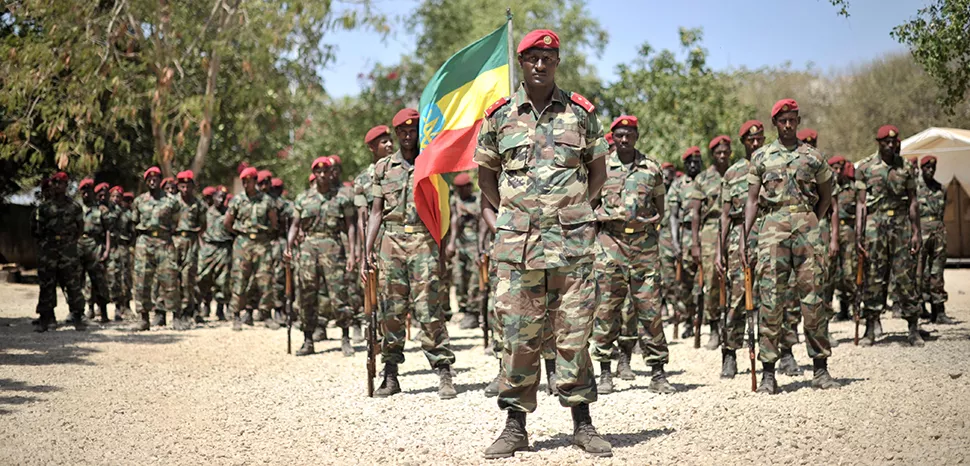 Photograph of the Ethiopian Army, AU UN IST PHOTO / Tobin Jones
Photograph of the Ethiopian Army, AU UN IST PHOTO / Tobin Jones
How Ethiopia’s Civil War Exacerbates Strategic Competition Between The U.S. and China
Nearly two years have passed since civil war broke out in the northern part of Ethiopia’s Tigray region. The Ethiopian government, led by Prime Minister Abiy Ahmed, is fighting a war against the Tigray Liberation Front (TPLF), the ruling party of Tigray. A five-month ceasefire that was in effect collapsed after truce negotiations failed. The conflict has recently escalated, with reports of violent attacks in the regions of Amhara, Afar, and Tigray. A report from the human rights organization Amnesty International exposed the war crimes the TPLF has committed against ethnic groups such as the Amhara. Through such events, the conflict spread from the northern region into communities that had otherwise been shielded from military operations. While the geopolitical trends of Ethiopia are important to the stability of East Africa, China and the U.S. have interests in the trajectory of this conflict in light of competition on the continent.
The ethnic disparities in Ethiopia are vast, with more than 90 ethnicities in the country and approximately 80 distinct languages spoken between 121 million people. The East African nation has been torn by ethnic tension for decades, which was an important catalyst for this conflict. Historically, this can be traced back to the harsh regime of Meles Zenawi and the TPLF’s 27-year-long reign notorious for its ultranationalism. The organization’s rhetoric created ethnic disparities and divided the nation. During this time, Ethiopia was a close U.S. ally, and the countries had strong diplomatic relations for decades. However, in recent years China’s presence in the Horn of Africa is increasing, while the U.S. is losing its momentum.
On that account, this complex conflict has become a breeding ground for disinformation, and fake news has fragmented the Ethiopian public’s perceptions, creating polarizing fronts. In late 2021, the Ethiopian government issued a letter of warning stating that Western media platforms such as the Associated Press, BBC, CNN, and Reuters were sympathizing with the TPLF and not providing impartial coverage of Ethiopia’s war. A multitude of Ethiopian news outlets reported on the warning and journalists such as Hermela Aregawi created a global movement with the hashtag #NoMore. The movement advocates for an end to disinformation and foreign interference in the ongoing war, especially that of Western media. Accordingly, the skepticism towards the U.S. continues while China becomes a prominent financial and diplomatic partner of Ethiopia.
China’s strategic emergence of influence in the Horn of Africa is causing rivalry with the U.S., especially because of Ethiopia’s geopolitical position. In addition to China’s emerging prominence in Ethiopia, it is important to note why this conflict should be on the radar of any country, especially powerful nations such as the U.S. Ethiopia’s war could ignite a global migration crisis, even if only a small percentage of the population becomes internationally displaced. Recent reports confirm that 2.6 million people have been displaced, most of them internally, while some 70,000 refugees seek asylum in Sudan. A migration crisis poses a threat to international security, which could affect the U.S.
Lastly, while Ethiopia’s foreign relations with the U.S. deteriorate, Chinese influence is surging, especially given China’s debt holdings accrued from Ethiopia’s participation in the Belt and Road Initiative. PM Ahmed has previously stated how most of his plans for modernizing the capital of Addis Ababa would not have been possible without Chinese financing. It is estimated that Ethiopia currently has 400 Chinese construction projects, amassing an external debt of almost $14 billion. With the merciless war and political instability, it is difficult to imagine how the debt crisis and the conflict will be resolved. International efforts such as the ceasefire have not created substantial change in the direction of the conflict. Most of the country is operating business-as-usual, with recent religious celebrations being carried out in Addis Ababa.
Announcements of interest in a peaceful resolution with the help of the African Union have sparked hope in Ethiopia and amongst its diaspora. But with war crimes reported on both sides of the conflict, any peace process is likely to be extremely fragile. The U.S. should pay attention to the trajectory of geopolitics in the Horn of Africa, particularly as Chinese relations with Sub-Saharan Africa are increasing, and Ethiopia is among the top five recipients of their foreign direct investment. Thus, seeking an impending solution to Ethiopia, the U.S. should consider how Chinese influence may affect the overall peace process and American aims in the region.





